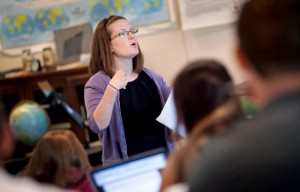Connection is at the center of everything Rachel Brummel does. And that makes her a perfect fit as Lafayette’s first professor hired specifically for the interdisciplinary environmental studies program.

Professor Rachel Brummel teaches a class in Van Wickle Hall.
“In my teaching, I work to connect what students are learning to their lives, other classes, current environmental events, and the broader community. In my research, I examine how people and organizations are connecting to address complex environmental issues,” says Brummel, assistant professor of environmental studies. “To understand and address environmental challenges, we need to connect disciplines, connect people, and connect institutions.”
Interdisciplinarity is the key strength of the environmental studies program, which includes the A.B. in environmental studies and B.S. in environmental science majors added last year. Brummel already is working with faculty across disciplines to enhance opportunities for students both in and out of the classroom. She and Steve Mylon, associate professor of chemistry and chair of environmental science and studies, are developing a program to build students’ environmental leadership capacities. She and Julia Nicodemus, assistant professor of engineering studies, are co-sponsoring the new Living Learning Community TREEhouse (The Real Environmental Experience House) that will provide a home and shared space for students to explore and experience sustainable living choices.
Along with Ben Cohen, assistant professor of engineering studies, David Brandes, associate professor and acting head of civil and environmental engineering, John Wilson, geology and environmental geosciences laboratory coordinator, and newly hired environmental projects coordinator Sarah Edmonds, Brummel is developing ways to increase student involvement with the College’s organic garden by including the garden in coursework and encouraging them to take an active role in sustainable food production on campus. Her Introduction to the Environment class, for example, includes work days in the garden as well as a field trip to the Rodale Institute in Kutztown, a nonprofit dedicated to organic farming research and outreach.
Brummel is pushing her students to cross disciplinary lines as well. Those in her Introduction to the Environment course, Mylon’s Environmental Chemistry course, the “Foods We Choose” First-Year Seminar taught by Ed Gamber, Roth Professor and head of economics, and the Environmental Engineering and Science course taught by Art Kney, associate professor and head of civil and environmental engineering, worked together on a semester-long research project this fall that resulted in an environmental poster conference.
Brummel also has developed two new courses, Environmental Policy and Organizations & the Environment, the latter of which includes community-based learning projects with Easton’s Nurture Nature Center on increasing community and college dialogue about local environmental issues. She plans to create additional courses as she learns more about the environmental interests of her students.
“My goal as a professor is to introduce students to the complexity and messiness of environmental challenges, while giving them the opportunity to envision possibilities for positive change,” she says. “I ask students to bring things they have learned in their sociology or geology or engineering classes to our discussions about biodiversity conservation. I want to continually connect what we are learning in class to emerging environmental events, and I want students to reflect on what they’ve learned in class when they are making decisions about whether to drive to the gym or use a plastic grocery bag or apply for an internship with an environmental organization.”
It is no surprise then that Brummel’s research also is about connection, a growing trend she has witnessed in her studies of how government agencies respond to environmental problems like climate change, wildfire, pollution, and invasive species. Much of her research focuses on the ways in which policy makers and environmental managers adapt institutions to address challenges that do not fit neatly into institutional boxes.
For her next research project, she will return to her childhood roots along the Mississippi River, where the time she spent exploring the backwaters, fishing, pulling apart wildflowers, and playing with insects laid the groundwork for her career in environmental conservation. Though the EXCEL Scholars undergraduate research program, engineering studies major Lucy Bass ’14 (Peterborough, N.H.) and international affairs major Alexandria Sousa ’14 (Milford, Pa.) will help Brummel examine inter-organizational networks developing to manage the emergence of an invasive species – Asian carp – in the upper Mississippi River Valley.
“Focusing my research on environmental policy and governance lets me combine my love and understanding of natural systems with my curiosity about people and politics,” she says. “In the face of environmental change, it is critical that our policies and institutions adapt to meet and address new challenges.”
